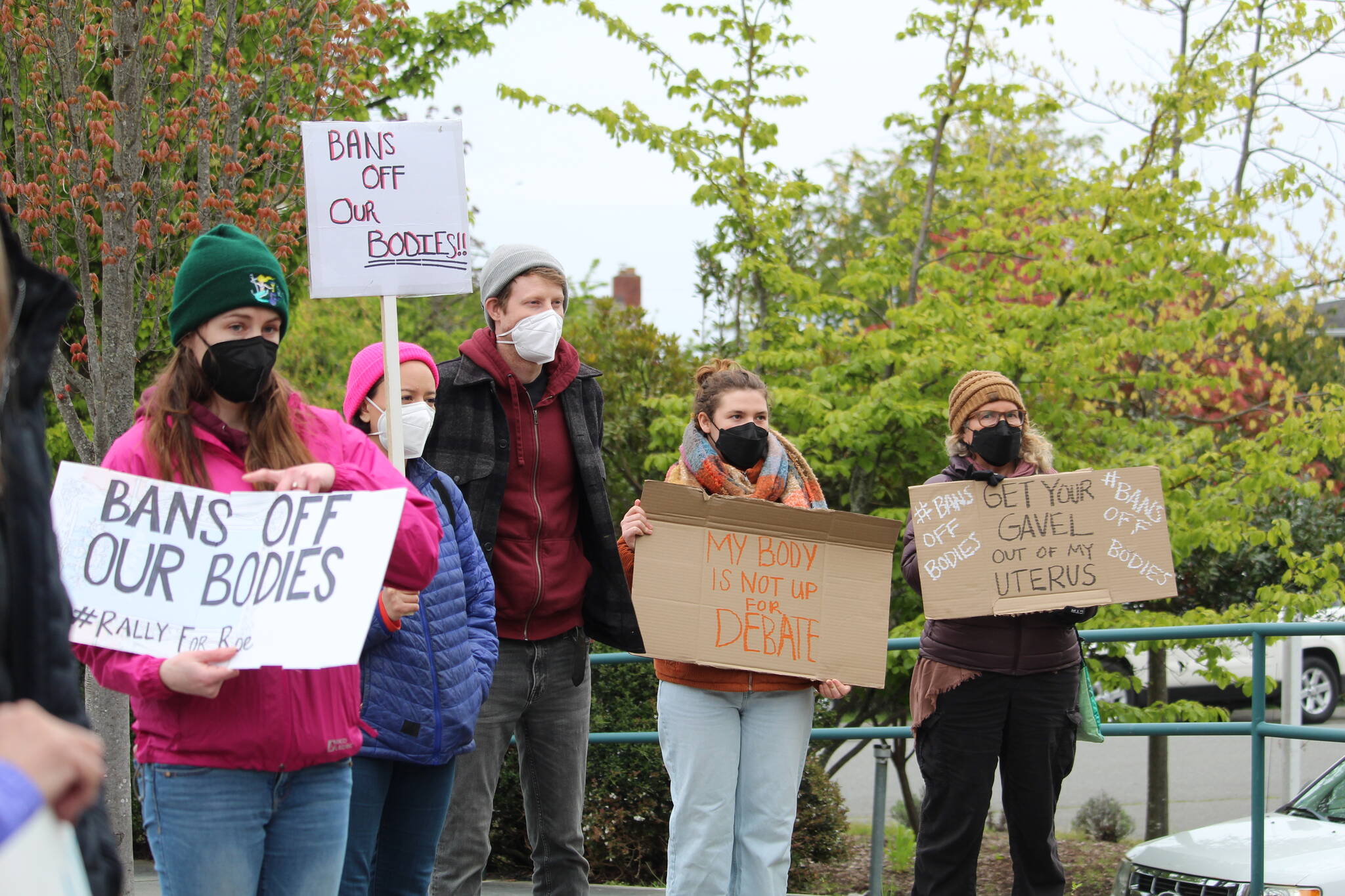Around 30 Whidbey residents gathered in front of the Island County Courthouse in Coupeville Tuesday afternoon to protest a leaked Supreme Court decision to overturn Roe v. Wade, the landmark case that has guaranteed abortion rights in the U.S. for nearly 50 years.
Though the leaked decision was only a first draft and remains subject to change within the coming months, island protesters and thousands of others who held similar rallies across the country on Tuesday fear that the impact of restricted abortion access could be devestating for women and that a Roe rollback is only a harbinger of other precedents the conservative court might overturn.
“I wish it was taken care of 50 years ago, because we still should not be having to fight this fight,” said Fe Mischo, one of the protest organizers.
Whidbey protesters sporting signs bearing messages such as “Bans off our bodies” and “We are not ovary-acting” marched around the block near the courthouse. Though it was a quiet afternoon in Coupeville and few cars or pedestrians passed by the site of the small gathering, organizers and attendees said they hope their actions will spark a larger conversation in the community.
“With our privacy being invaded in this way, it now becomes important for us to stand up and to be seen and to be counted,” said Larry Behrendt, another protest organizer. “It’s the sharing of the stories that makes the change. … We want people to know, it’s okay to talk about this.”
Behrendt said that the 1973 Roe v. Wade decision was predicated upon the right to privacy granted by the Constitution. Other landmark decisions, such as those protecting interracial and same-sex marriages and access to birth control, are similarly connected to the constitutional right to privacy, Behrendt said.
His concern, he added, is that overturning Roe will open a window for the court to walk back some of those other decisions.
“We’re talking here about a fundamental right to tell the government, ‘This far, but no further,’” he said. “This is a matter of fundamental privacy rights.”
Mischo added that low-income folks will bear the brunt of this decision. While some pregnant people living in states with restricted abortion access will be able to afford to travel to a state with fewer restrictions, those without the means to make the trek will lose access to abortion services entirely.
The impact of this will be far-reaching, she said; it will mean more children and families requiring tax-funded welfare services.
For protest attendee Ellen Christensen, abortion access is first and foremost a health care issue. She said while she understands those who advocate against abortion out of concern for unborn children, some circumstances simply require that type of medical intervention.
“People love babies,” she said. “It’s just needed sometimes.”
Several women in attendance at Tuesday’s rally described feelings of shock and sadness upon learning about the Supreme Court decision.
“I can’t believe that this is being even discussed anymore,” said South End resident Joan Green.
The news broke on Monday, when Politico reported that a leaked Supreme Court draft opinion written by Justice Samuel Alito revealed the court’s intent to strike down Roe v. Wade, effectively recalling federal constitutional protection of abortion rights and freeing states to set their own limits on abortion access. The court is expected to release a final decision this summer.
The New York Times reported that as many as 28 states may ban or severely restrict abortion access if Roe v. Wade is overturned, with many of these states having “trigger laws” on the books that will go into effect when that happens.
Washington is not one of these states; abortions have been legal in Washington state since 1970. Gov. Jay Inslee said in a press conference at a Seattle rally on Tuesday that he intends to “fight like hell to keep Washington a pro-choice state” by securing legal protections for abortion, perhaps including a provision in the state constitution.
“We will not allow the tentacles of Texas to get into Washington state,” he said.
He added that he will work to ensure the state has adequate resources for women from other states seeking abortions in Washington, promising that they will be welcome and safe. Idaho is the closest state to Washington where abortions would effectively become illegal should Roe be officially overturned. According to the Idaho Statesman, Idaho has a trigger law in place that will make it a felony for any health care provider to perform or attempt to perform an abortion.
Other Washington elected officials have spoken out against the Supreme Court decision, as well; State Rep. Rick Larsen, a Democrat, reaffirmed his pro-choice views in a press release shortly after news about the leaked draft opinion broke.
“For nearly 50 years, the Roe v. Wade Supreme Court decision has guaranteed a woman’s right to choose. I steadfastly support that right, and I will continue to stand with women and advocates in Washington state and across the country to ensure a woman’s right to access safe reproductive health care,” he stated in the press release.



